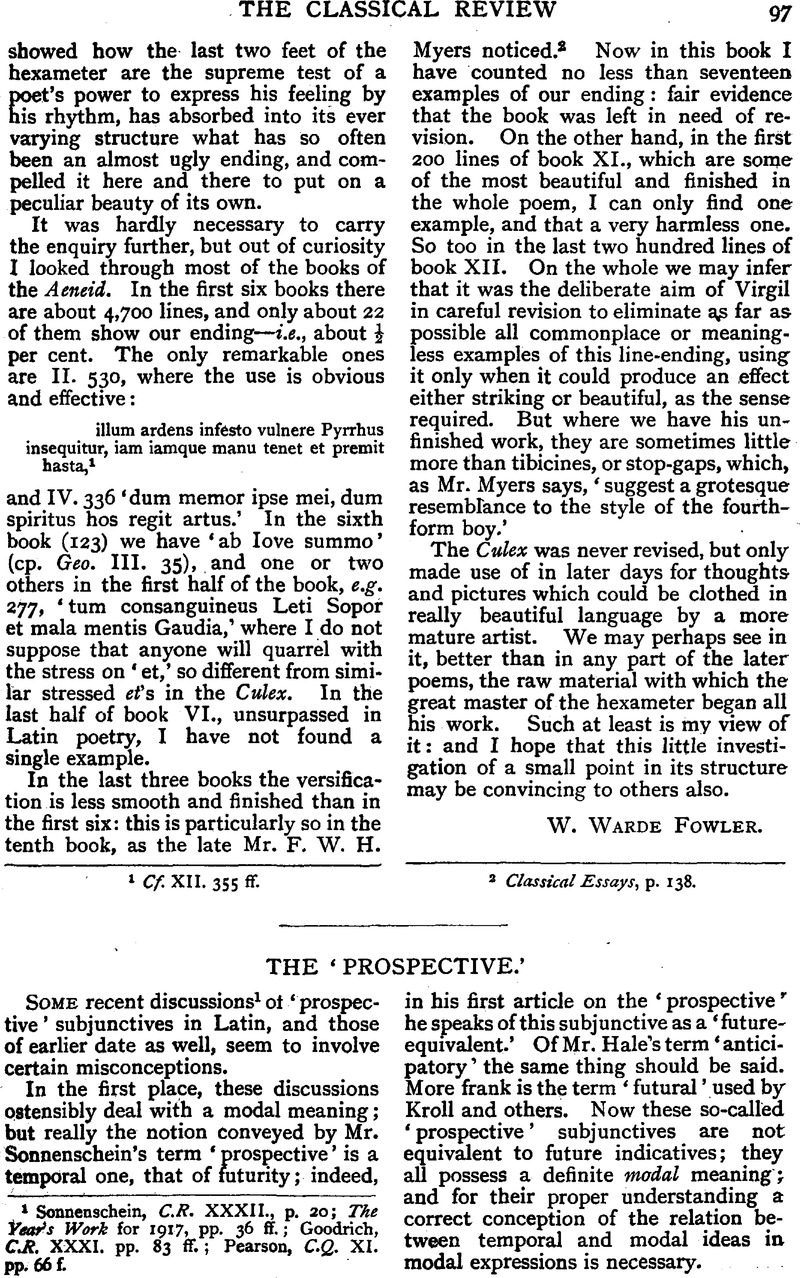No CrossRef data available.
Article contents
Abstract

- Type
- Original Contributions
- Information
- Copyright
- Copyright © The Classical Association 1919
References
page 97 note 1 Sonnenschein, , C.R. XXXII., p. 20Google Scholar; The Year's Work for 1917, pp. 36 ff.; Goodrich, , C.R. XXXI. pp. 83 ff.Google Scholar; Pearson, , C.Q. XI. pp. 66fGoogle Scholar.
page 98 note 1 This, by the way, is the background of truth in the conception of the subjunctive as the mode of the act conceived, of pure thought, etc. In any modal expression the act itself, since its existence is not asserted, is in a sense merely thought of.
page 98 note 2 See Sweet, New English Grammar, § 2297.
page 98 note 3 The term ‘determined futurity’ which I employedin two articles in Classical Weekly (X. pp. 178–181 and 185–188 and XI. pp. 161– 164 and 169–172) is objectionable because it implies that the subjunctive expresses futurity. With the English ‘compulsive’ cf. the use of est and infinitive in Augustine Civ. D.J., 3 ‘ nam seminibus nasci in terra et ex terra est’ and the use of habeo and infinitive, the forerunner of the Romance future and conditional. See Draeger, Hist. Syn. 2, § 414.
page 98 note 4 It has an important bearing on several important problems in Latin modal syntax, for example, the problem of the difference in meaningbetween prohibitions with the present subjunctive and those with '; the perfect and the problem of the sequence of tenses.
page 98 note 4 When we assign to the subjunctive ot the priusquam and antequam clauses the meaning of external determination, the difficulty met with in such examples as the following vanishes. Liv. 5. 33. 5, ‘ ducentis quippe annis antequam Clusium oppugnarent in Italian transcenderunt., Clearly the act of oppugnarent was not expected or anticipated or in prospect; but it was to be. See Hale, , Anticipatary, p. 86 fGoogle Scholar.
page 99 note 1 The real character of the subjunctive in these clauses has been quite clearly stated by MrSonnenschein, , Unity, pp. 36 ff.Google Scholar; but what he sees as the fundamental and unifying meaning of the Latin subjunctive—‘obligation’‐is nothing but the essential character of modal ideas in general. It belongs to the Greek optative and to theEnglish periphrastic modal expressions. The meaning of external determination is as distinct from the volitive meaning as either is from that of capacity, meaning of English ‘ can.’ To place volitive and compulsive subjunctives under one head, as Mr. Sonnenschein does, is to neglect the most important distinction in Latin modal syntax. The failure to make this sharp distinction keeps him from seeing that in a purpose clause we have todo with a clause of willed result, while in a ‘result’ clause we have to do with an externally determined'result.


